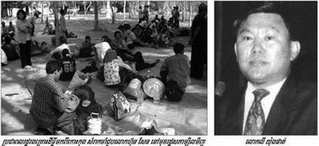Koh Kong Families are demonstrating

Koh Kong villagers (L) who came to demonstrate in Phnom Penh
about the lands they lost to CPP Tycoon-Senator Ly Yong Phat (R), are settling
themselves in front of the National Assembly to have their case heard and resolved.
(Photo: Sralanh Khmer Newspaper)
about the lands they lost to CPP Tycoon-Senator Ly Yong Phat (R), are settling
themselves in front of the National Assembly to have their case heard and resolved.
(Photo: Sralanh Khmer Newspaper)
Thursday, March 08, 2007
Koh Kong Families are demonstrating
By Kang Kallyan
Cambodge Soir
Translated from French by Luc Sâr
They took the road from Koh Kong since Monday, they are men, women, children, and old people who have walked from their far away southwestern province. They completed their journey by bus to arrive in Phnom Penh on Tuesday evening. Since then, they have been demonstrating in front of the National Assembly, holding pictures of the prime minister and that of his wife. They protest against the expropriation of their lands, and the absence of reaction from the local authorities in spite of negotiations which were held for several months.
Their object of their grievances is a contract concluded last summer between the Ministry of Agriculture and two private companies for a 90-year land concession. The concession was destined for a sugar cane plantation covering an area of 20,000 hectares, 9,700 of which belong to farmers in three villages: Chi Khor, Chhouk, and Trapeang Kondor, all in Sre Ambel district.
41-year-old Lach Hour lost all her farmlands. “We are no longer eating our fill anymore. The company took away the 8-hectare of land I owned, and they finished clearing half of it already,” the mother of 7 explained. She added that no compensation was given to her for her lands. Lean Muy lost her small 35-square-meter plot where she grew cashew nut. “I lost everything,” the old woman said in tears.
It is not because the farmers did not ask for intervention from the authorities, in fact the villagers brought three complaints against the two companies belonging to CPP Tycoon-Senator Ly Yong Phat. Later on the companies proposed to some villagers a compensation of between 150,000 and 200,000 riels ($38 to $50) per hectare. The two parties did not come up to an agreement, the villagers who lost their lands would like to be compensated in land [exchange] rather than money. Faced with the quagmire of the conflict, the villagers are now appealing to the prime minister. “We will not leave as long as our problems are not resolved,” one of the representative of the villagers declared. “Now that we are here, we are not moving.”
Their object of their grievances is a contract concluded last summer between the Ministry of Agriculture and two private companies for a 90-year land concession. The concession was destined for a sugar cane plantation covering an area of 20,000 hectares, 9,700 of which belong to farmers in three villages: Chi Khor, Chhouk, and Trapeang Kondor, all in Sre Ambel district.
41-year-old Lach Hour lost all her farmlands. “We are no longer eating our fill anymore. The company took away the 8-hectare of land I owned, and they finished clearing half of it already,” the mother of 7 explained. She added that no compensation was given to her for her lands. Lean Muy lost her small 35-square-meter plot where she grew cashew nut. “I lost everything,” the old woman said in tears.
It is not because the farmers did not ask for intervention from the authorities, in fact the villagers brought three complaints against the two companies belonging to CPP Tycoon-Senator Ly Yong Phat. Later on the companies proposed to some villagers a compensation of between 150,000 and 200,000 riels ($38 to $50) per hectare. The two parties did not come up to an agreement, the villagers who lost their lands would like to be compensated in land [exchange] rather than money. Faced with the quagmire of the conflict, the villagers are now appealing to the prime minister. “We will not leave as long as our problems are not resolved,” one of the representative of the villagers declared. “Now that we are here, we are not moving.”

